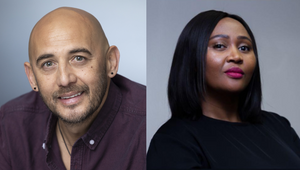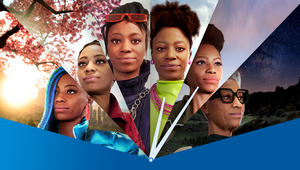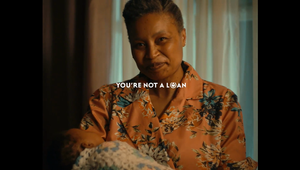
5 Minutes with… Nkanyezi Masango

He moved back to South Africa in 2011 – first working at
Y&R Cape Town before moving to indie royalty, King James. Outside of his
day job, he’s doing what he can to help shake up the diversity of a disproportionately
white and privileged industry with his Blackboard initiative, in which he runs
workshops for kids at underprivileged high schools.
But busy and prolific as he is, Nkanyezi is a creative with
a sense of perspective. Perhaps it’s his affinity with the outdoors – he
describes nature as ‘the best designer’ – that keeps him grounded. LBB’s Laura
Swinton caught up with him to learn more.
LBB> Where do you think your creativity came from? Did
you have much exposure to creativity growing up?
Nkanyezi> I was an only child and I feel like, because I didn’t
have anyone to hang around with who was my age as a child, I had to have a lot
of imagination. For instance, when I played, I had to play different roles and create
different voices for each character myself. That released my imagination because
I had to figure out all these different roles and imagine myself in all these
different scenarios.
My Mom took me to a Waldorf school from the age of six –
Waldorf schools are all about creativity so in a way I felt like my creativity
was always protected. Government schools in South Africa kind of break your
creativity down, at my school it was always protected. If you were into drawing
and music and things like that you could take those subjects and refine them.
When I grew older, I just knew I would be in a creative industry. I didn’t know it would be advertising.
LBB> Early in your career, you left South Africa and went
to TBWA Hong Kong for four years. How did that come about?
Nkanyezi> My friend was working at TBWA and I just asked if there were any openings for writers. To be honest it was a long shot… and he said, ‘sure let’s get it done’. I couldn’t believe he was being serious. I was interviewed by about ten people at different stages. It took about four or five months. They sent me a contract, I signed it… and they sent me a one-way ticket!
LBB> When you first got off the plane, what was your
first impression?
Nkanyezi> It was summer when I left South Africa; I got
there and it was freezing. This was only my second international trip – I had
been to London before. I get to the airport and I was a bit intimidated. I hadn’t
seen a lot of Asian people in my life. You always see them as a minority where
I come from. For the first time in my life, I’m a minority. I wasn’t used to
that.
The working culture there is also very different. They start
late and they finish late. In South Africa, you start early and finish early.
There people would get to the office at 10.30… some would push it to 11… But
they would finish at 10 at night. I couldn’t grasp it. It was just beyond. I
didn’t know how I would survive.
My initial instinct was to buy a return ticket! But six months later I fell in love with the place. I couldn’t leave, I had made so many friends.
LBB> What were you working on?
Nkanyezi> It was mostly regional. I was hired as the English writer. They needed someone who would work on accounts that didn’t require any Chinese writing. For instance, we had Shangri-La hotels – their audience was not only APAC but the West as well. And we had adidas, which was the reason I signed the contract in the first place – that was very regional but I worked with the Germany-based clients. I got to do a little bit of work on the 2008 Olympics too, which was exciting.
LBB> Creatively, how did the experience of being plunged
into a completely new environment change your work?
Nkanyezi> It took me to a different part of my brain that I didn’t know existed. I got new insights into human behaviour. On the one hand, human insights are generally quite universal but there are certain nuances that you will pick up from a place like Asia. That opened up new creative avenues that I never would have tapped into living in South Africa. I feel like as a foreigner you are generally more observant than someone who is from that environment because your eyes are always so wide open. You’ll pick up on things. It’s the same reason that kids are so observant – everything is so new.
LBB> And did it make you look at South Africa through different
eyes?
Nkanyezi> Definitely. When you move to a new environment you’re
constantly comparing to back home. And also you find things that are positive
about Asian culture that I wished we have in South Africa. It makes you realise
that there might be things that you don’t know are bad until you get out.
Asian hospitality was amazing. People are so hospitable in Hong Kong in a ways that I never experienced in South Africa. I learned a lot.
LBB> What happened when you got back to South Africa?
Nkanyezi> I moved to Y&R Cape Town right after that, which was also an amazing space. Even though it was South Africa, it was a new city to me. Because I had experienced the teething process in Hong Kong, the transition of moving to Cape Town was an easy one because I was accustomed to being the new person in the new city and had made my progress a lot faster. I worked really hard when I got there because I didn’t really have much of a social life. The only thing I had was work and it was a bit of an advantage, actually. I was quite prolific and got promoted quite quickly. I got there as a writer and became a group head in less than a year. The following year I was a creative director.
LBB> Nowadays do you still see yourself as a writer?
Nkanyezi> Yes, I do. I think that will always be part of me. I love writing. I loe words. I just feel like I have an additional role where I help other people do the writing and coming up with ideas.
LBB> So what do you like to read?
Nkanyezi> I love reading autobiographies. I’m not into reading fiction all that much. I like reading about people who exist now. Elon Musk. Phil Knight. Steve Jobs. I love those types of stories just because I believe that reality is so much more fascinating than fantasy for me. Like they say, the difference between fiction and non-fiction is that fiction has to make sense. And I find it inspiring.
LBB> Throughout your career, who has inspired you?
Nkanyezi> When I got to Y&R, I worked with Graham Lang. He’s the guy who promoted me and when you spend a lot of time with someone in a professional sense, a lot of the things that they teach with you stay with you for ever. His work ethic, [the importance of] pushing yourself. Not being satisfied easily. He also really created a lot of opportunities.
And the guy who hired me in Cape Town was Clinton
Bridgeford. If it wasn’t for him I wouldn’t have moved to Cape Town.
And, lastly, Alistair King. I’ve only been working at his agency for two years but I have admired him from afar for 10, 15 years. His courage to remain independent as an agency is fantastic. The industry needs more characters like that. It takes a lot of character to not give in and to stand for something.
LBB> Having moved from the big network agencies to an
independent shop, how does that change how you can approach the work?
Nkanyezi> It changes a lot of things. There’s less
pressure in that you’re not thinking about how someone in New York or London is
going to respond to your decisions. Every major decision is made within the
office. It gives you a lot more confidence to just be bold. For instance, at
the agency, for example, if you’ve had a crazy good month the guys, Alistair
will send an email and say let’s go downstairs and have a barbeque right now.
That’s like two hundred people. It’s not something I’ve seen at a big network
agency. Culturally, the agency behaves very differently.
And when I was working at a big international agency, there’s
pressure to win certain awards. You’re told you ‘have to win eight Lions this
year’, which is a great challenge. Who doesn’t want to win a Lion?
But what that does is that sometimes you might start looking at ways to win an award as opposed to doing the best work for a particular brief or client or whatever it is. You look at the work with a different lens when you’re looking to win an award. You’re not looking to solve the problem in the best way. But if you’re doing the best work for a client it will win awards anyway. Work that’s designed for awards shows.
LBB> It’s a difficult climate economically now but has
the experience inspired you to set up your own place in future?
Nkanyezi> Yeah, I think South Africa is obviously saturated in terms of agencies but working with Alistair and those guys and seeing how good they are at running a business without compromising the quality of the work is definitely inspiring. I would love to contribute to the industry in that way someday too.
LBB> I’ve spoken to a few South Africans recently who
reckon that South African advertising is finding its voice. I thought it was interesting
because I think even ten or twelve years ago I saw work that felt distinctive.
What are your thoughts? Is there anything that makes the work distinctive?
Nkanyezi> Definitely. But I’m not sure if we have exploited it enough yet. A lot of the work that has been awarded internationally has been a very universal type of work. But there’s a lot of work in South Africa that I feel is really unique to South Africa but I don’t see it enough I the global stage. There’s room to really maximise on our own voice. But it’s changing. The South African industry is still not as diverse as it could be – and the more diverse it becomes, the more distinctive our voice will become.
LBB> I think every country, in its own context, is having
that discussion around diversity. In every country, the challenges are
specific. But most often it’s about giving representation and space to talent
from groups that are a minority within a country – whereas in South Africa, the
majority of the country is black and the ad industry is still overwhelmingly
white.
Nkanyezi> That’s crazy. I feel like it has a lot to do
with the fact that the creative industry is an industry that has always been
reserved for the privileged people. People who went to private school, who had
enough money to explore creativity as a career. If you come from a typical
black family, your parents won’t encourage you to pursue a creative career
because they don’t feel that you’re definitely going to have a stable income.
They will encourage you to be a doctor, something they’re familiar with.
I think it’s indicative of that but also I suppose it’s also a microcosm of the economy in South Africa. A lot of the money is still in the hands of the whites and blacks are mostly on the lower class side, even though it’s changing definitely.
LBB> And is the industry making an effort to change that?
Nkanyezi> There’s been a lot of talk for a long time.
Action has been very slow to be honest. In the last few years I fell like the
pace has picked up a bit but to be honest I feel like it’s still slow.
Alistair has created a programme for copywriters from underprivileged
backgrounds to get into writing. In my personal capacity, I’ve started an initiative
called Blackboard. The purpose of it is to expose people from underprivileged
high schools to the industry.
Basically, we do workshops every second Saturday. I invited people from different disciplines, for example, design or cinematography. They’ll talk to them for two hours and give them assignments and build projects around it. I’ve been doing it for about two years. I started it but now I have a team of people who help me run it and a lot of industry friends contribute by coming and giving a talk. It’s quite fulfilling. You meet young students who are very curious about creativity and often you get inspired yourself because they have ideas that you would never have thought of. It’s a win-win for everyone who gets involved.
LBB> So you really make an effort to get out of the
advertising bubble?
Nkanyezi> That’s the thing about creativity. If you hang around with people from the same background who all watch the same shows on Netflix, all check out the same blogs, all dress similarly and all these things, how on earth are you going to be original? You all have the same references. You basically limit your creative horizons. If you socialise with people who are different to you and go places you normally wouldn’t go, you’re more likely to discover things that would inspire your creativity.
LBB> So that sounds like it takes up a lot of your time,
but when you do have spare time, what do you like to do?
Nkanyezi> I love the outdoors. Cape Town allows for that
lifestyle. Hiking is my favourite thing. Being in nature is the best thing because
you forget about the world that we’re in day to day. You’re not thinking about
brands or briefs – you’re just walking in a forest, looking at beautiful views.
It puts things in perspective. Not in a bad way, but it reminds you how insignificant
the industry is or humans are. Nature is, to me, a reminder that there’s more
to life than a deadline.
I also love design. And nature – whether it’s the universe
or God or whatever you believe in – is the best designer. Think of how a tree
grows, the design of a tree … I love appreciating that kind of beauty.















